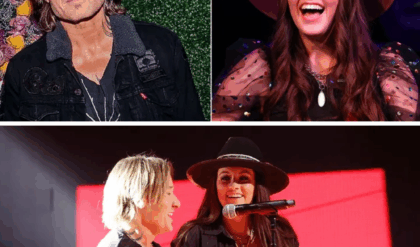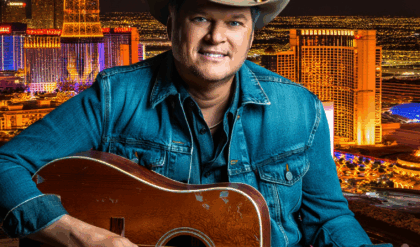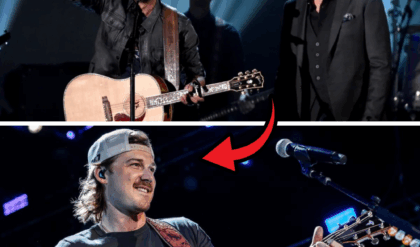The country music world was recently shaken by a surprising controversy surrounding Blake Shelton’s performance at the American Music Awards (AMAs) on May 26, 2025. Fans expressed significant disappointment and frustration after discovering that what was billed as a live appearance by the beloved singer was, in fact, a pre-taped performance. This article explores the events leading up to the backlash, the reactions from fans, Shelton’s response, and the broader implications for live entertainment and artist-fan relationships in the digital age.
The AMA Incident
The American Music Awards, held at the Fontainebleau in Las Vegas, promised an evening filled with electrifying live performances, with Blake Shelton slated to perform his latest hit, “Stay Country or Die Tryin’.” Fans, both in the audience and watching from home, were excited to see the Oklahoma native take the stage. However, the reality fell short of expectations. Attendees quickly realized that Shelton’s performance was being projected onto a large screen, revealing it had been pre-recorded rather than performed live.
The disappointment spread rapidly on social media, especially on TikTok. One attendee shared a video with the caption, “She’s not here!,” pointing out Shelton’s absence during his set. Another user commented, “The craziest part of the AMAs last night was being told ‘and here’s Blake Shelton Live’ only for them to light up the stage like he’s there, and never saying it was pre-recorded.” The mismatch between the event’s promotion and the actual delivery left many feeling misled, with one fan summing it up bluntly: “The whole show could have been an email.”
Adding to the confusion, Shelton was photographed on the red carpet wearing the same outfit from the pre-taped performance, leading some to initially believe he had performed live. This illusion only intensified the growing frustration among fans who felt the AMAs had misrepresented the event’s authenticity.
Fan Reactions and Backlash
The backlash was immediate and vocal. Fans flooded Twitter, Instagram, and TikTok with their dismay, with reactions ranging from mild disappointment to outright anger. “I paid good money to see Blake live, not a video playback,” one fan tweeted, a sentiment echoed by many who attended the event. Others accused the AMAs of using a bait-and-switch tactic, with one user writing, “If it’s pre-taped, just say so. Don’t sell it as live and then pull this.”
The controversy also sparked wider conversations about the role of live performances in an era where technology enables seamless pre-recording. Some fans argued that pre-taped sets diminish the spontaneity and connection that define live music, while others speculated about logistical reasons, such as Shelton’s busy schedule, that might have led to the decision. Regardless of the cause, the lack of transparency became the core issue driving the fan outrage.
This isn’t the first time Shelton has faced criticism from his audience. Past incidents, including his controversial tweets from 2011 and disputes over concert ticket refunds during the COVID-19 pandemic, have tested his relationship with fans. However, the AMA incident stands out due to its public nature and the high expectations surrounding the event, amplifying the sense of betrayal felt by many.
Shelton and Stefani’s Response
Following the outcry, Blake Shelton and his wife, Gwen Stefani, addressed the situation in a joint interview. Shelton acknowledged the fans’ disappointment, saying, “We understand why folks were upset, and we’re sorry for any confusion. Sometimes logistics get in the way, but we never meant to let anyone down.” Stefani added, “We love our fans and always want to give them the best experience. This was a production choice, not a reflection of our commitment.”
The couple’s response emphasized their desire to maintain open communication with their audience, a strategy that has worked well since their marriage in 2021. They also hinted at future plans, with Shelton noting, “We’re looking forward to the kids being out of school this summer, and we’ve got some fun shows lined up. Nothing’s tying us down, so we’ll make it up to everyone.” This reference to their blended family life, split between Oklahoma and California, seemed to soften some of the criticism, as fans appreciated the personal touch.
The decision to pre-tape the performance was likely influenced by Shelton’s packed schedule, which includes his new CBS series, The Road, and occasional appearances on Barmageddon. However, the lack of prior announcement about the pre-recording suggests a communication breakdown between the AMAs organizers and the artists, leaving Shelton in an uncomfortable position.
Broader Implications for Live Entertainment
This incident highlights a growing tension in the entertainment industry between live and pre-recorded performances. With advancements in video technology, pre-taping has become commonplace, allowing artists to ensure high production quality and manage scheduling conflicts. However, it also risks alienating audiences who cherish the unpredictability and intimacy of live shows. The AMAs’ failure to disclose Shelton’s pre-taped set contrasts with other events where artists, like Dolly Parton during her recent tributes, have been upfront about such arrangements, avoiding potential backlash.
The rise of social media has further complicated this dynamic, giving fans a platform to voice their opinions in real-time and hold artists accountable. Shelton’s experience may push event organizers to adopt clearer labeling—distinguishing between live and pre-recorded performances—to manage expectations. It also raises questions about the future of awards shows, which increasingly rely on pre-taped segments to feature global talent, potentially at the expense of the live experience.
Shelton’s Career Context
Shelton’s career has been defined by resilience and reinvention. From his debut single “Austin” in 2001 to his 30th number-one hit, “Texas,” in 2025, he has remained a dominant force in country music. His time on The Voice from 2011 to 2023, where he coached nine winning teams, broadened his appeal beyond the genre. Recent collaborations, such as his duet with Post Malone on “Pour Me a Drink,” have brought fresh energy to his work, though his latest album, For Recreational Use Only, debuted at number 46 on the Billboard 200, signaling a slight dip in commercial dominance.
Despite these accomplishments, Shelton’s off-stage persona—marked by candid social media posts and occasional controversies—has sometimes clashed with his polished public image. His decision to leave The Voice in 2023 to focus on family and new ventures reflects a deliberate shift in his career. The AMA incident, while a setback, is unlikely to derail his long-term success, given his loyal fan base and adaptability.
Conclusion
Blake Shelton’s recent “appearance” at the 2025 AMAs has left some fans very upset, shedding light on the challenges of balancing modern production demands with traditional expectations of live performance. The backlash, fueled by a lack of transparency, underscores the importance of clear communication in preserving artist-fan trust. While Shelton and Stefani have responded with apologies and promises of future engagement, the incident serves as a cautionary tale for the entertainment industry.
As Shelton navigates this controversy, his focus on family and projects like The Road suggests a move toward a more selective career path. For fans, the episode may prompt a reevaluation of what they value in live events, potentially influencing how future performances are presented. Ultimately, Shelton’s ability to overcome this storm will hinge on his continued connection with his audience—a connection that has been both his strength and, momentarily, his challenge.





